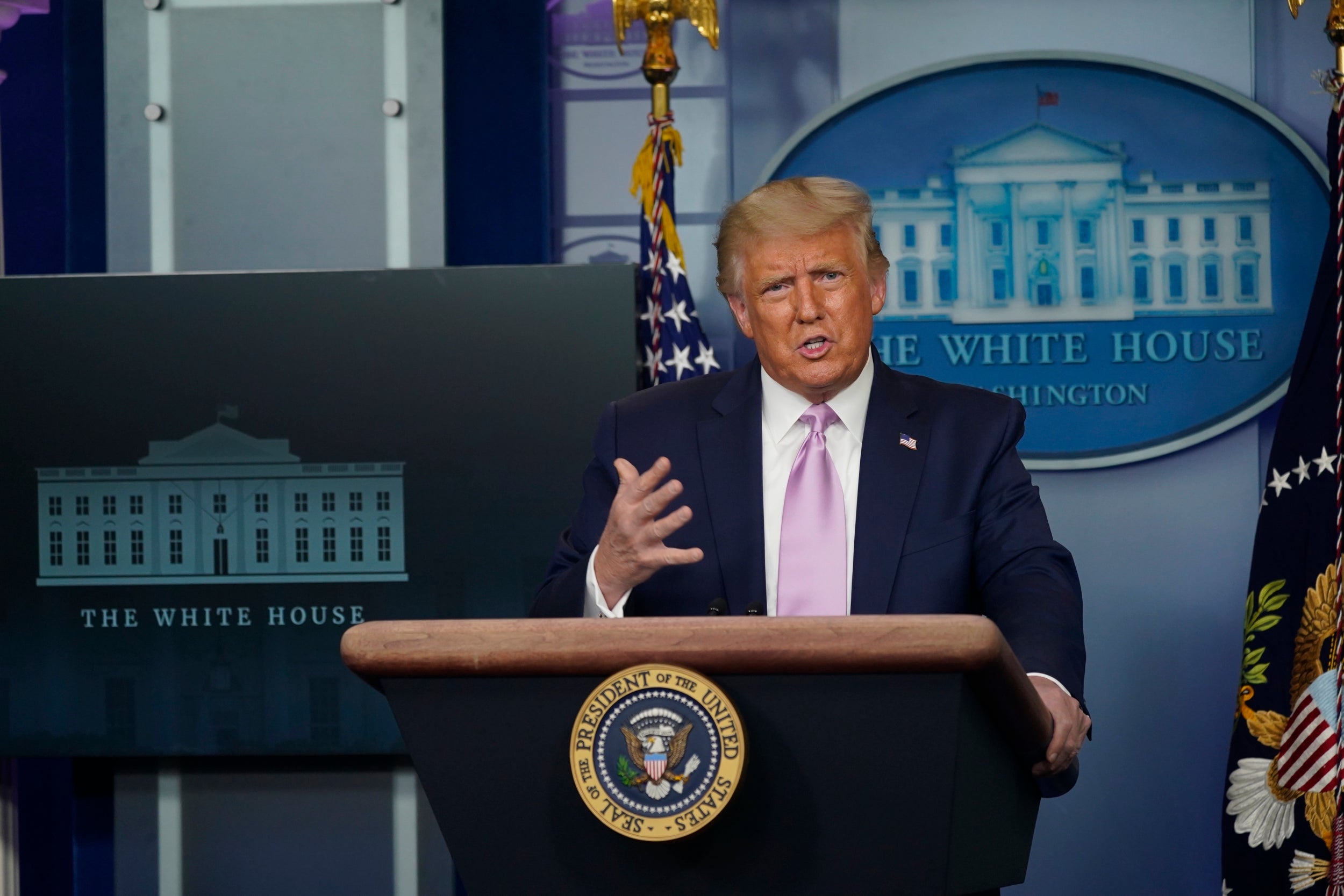
Donald Trump gave new hope to QAnon conspiracy theorists who believe he is waging a secret war against a deep state of paedophile cannibals by saying that he would be willing to help them "save the world".
Asked at his daily press conference what he thinks about the QAnon movement, the president said he didn’t know much about it other than they “like him very much, which I appreciate”.
At the crux of the theory is a belief that the president is secretly working to save the world from a satanic cult of paedophiles and cannibals. When asked if that was something he was behind, Mr Trump said he was willing to put himself “out there” to help.
“Well I haven’t heard that, but is that supposed to be a bad thing or a good thing? You know, if I can help save the world from some problems, I’m willing to do it, I’m willing to put myself out there,” Mr Trump said.
“And we are actually, we’re saving the world from a radical left philosophy that will destroy this country, and when this country is gone the rest of the world would follow.”
The Biden campaign said Mr Trump's response to QAnon was another example of the president "giving voice to violence".
"After calling neo-Nazis and white supremacists in Charlottesville 'fine people' and tear gassing peaceful protesters following the murder of George Floyd, Donald Trump just sought to legitimize a conspiracy theory that the FBI has identified as a domestic terrorism threat," Biden campaign spokesperson, Andrew Bates, said in a statement.
The pro-Trump supporters of the QAnon theory have continued to grow since he was elected president, and often attend his rallies wearing "Q" shirts.
The first time Mr Trump was asked about QAnon during a White House press conference last week, he refused to address the conspiracy directly. When asked about one of the theory's proponent's, Marjorie Taylor Greene, who won the Republican primary for Georgia's 14th Congressional district, Mr Trump congratulated her but moved on quickly to the next question.
When asked again on Wednesday, the president said that while he doesn't know much about the movement, he does know they are people that love the country and don't like seeing it the way it is.
"I have heard that it is gaining in popularity and from what I hear, these are people that when they watch the streets of Portland when they watch what happened in New York City in just the last six or seven months, but this was starting even four years ago when I came here," he said.
"These are people that don't like seeing what's going on in places like Portland and places like Chicago, and New York and other cities and states."
Mr Trump's 2016 Republican primary opponent, Jeb Bush, was also quick to denounce the president for his apparent embrace of the conspiracy theory.
"Why in the world would the President not kick Q'anon supporters' butts? Nut jobs, rascists, haters have no place in either Party," Mr Bush said in a tweet.
Adherents to the conspiracy theory believe a mysterious but anonymous figure known as "Q" leaves cryptic but often prophetic messages on websites such as 4chan. Different theories contend that Q is a former intelligence officer, a group of people or perhaps even Mr Trump himself.
It has increasingly come into the mainstream during the course of Mr Trump's presidency, with several Republican candidates identifying themselves with it.
QAnon is linked to the notorious Pizzagate conspiracy, which claimed that Hillary Clinton and others were running a paedophile ring from the basement of a DC restaurant.
In 2016 a heavily armed North Carolina man drove to the restaurant to free the children he believed were trapped there and opened fire. However, the restaurant had no basement and there were no children. The gunman, Edgar Maddison Welch, was sentenced to four years in jail. He apologised for his actions and said he had made an "incredibly ill-advised decision".







